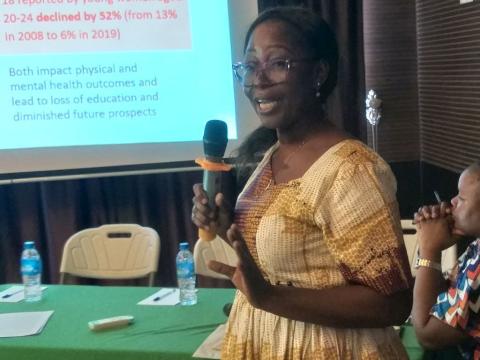By Saio Marrah
Findings of a study conducted by Save the Children Sierra Leone under a project titled: “Ending Child Marriage (ECM)”, has revealed that pregnancy and poverty are the underlying causes of early child marriage in Sierra Leone.
The qualitative study was conducted this year in Kissy Teng, Mandu, Peje Bongre, and Yawei Chiefdoms in the Kailahun district.
The Demographic and Health Survey shows that girls and young women between the ages of 15 to 19 that were married or living with their partners have reduced by 54% between 2008 -2019, but the number is still considered huge.
According to the survey report, boys and young men who had sexual intercourse between the ages of 15 to 19 dropped to 37%, while for girls and young women it remained at 56%.
Causes of girl-child and adolescent early marriage were linked to having too many children in a family, lack of care or supervision, being forced to live with a boy’s family due to pregnancy, financial benefits a girl’s family could derive through marriage, the desire for independence, and peer pressure.
A female participant created a scenario saying: “My mother has no money, my father has no money. This person has come into my life. He has money and he comes and proposes love to me.”
The report stated that early child or adolescent marriage could lead to domestic violence because of vulnerability as a result of tender age and lack of family support.
The objective of the study was to identify viable solutions to reduce adolescent pregnancy and child marriage.
It also identified key determinants that contribute to adolescent pregnancy and child marriage.
Causes, challenges, benefits, and solutions to adolescent and early child pregnancy were all highlighted in the report.
The ECM study shows that respondents as a whole were concerned about adolescent pregnancy and child marriage, and were aware of the negative effects they have.
The findings also affirmed the result of previous studies as to how community members can work together to reduce the incidences of adolescent pregnancy and child marriage.
The study employed two qualitative research methods namely Participatory Action Research (PAR) and Key Informant Interviews (KIIs). KAR participants were aged 18 years and older and included youth, adults,s and the elderly. KII participants were Chiefs, Female Genital Mutilation (FGM) initiators known as Soweis, women leaders, and health workers.
Participants at the presentation of the findings include Civil Society Activists, Paramount Chief Members of Parliament, and other key stakeholders. They all acknowledged that the findings of the study were not limited to Kailahun district, but prevalent in almost every part of the country.
Among the various suggestions, was for the government to enforce more available laws that protect girls from early child marriage and teenage pregnancy.
Head of Monitoring, Evaluation, Accountability and Learning, Josephine Kainessie, in her PowerPoint presentation to various stakeholders said the project is a two-year pilot programme that is intended to be translated into a replicable model and that it is geared toward creating a significant shift in beliefs, and societal norms and supported by policies to end child marriage in the country.
Copyright © 2022 Politico Online (29/06/22)








